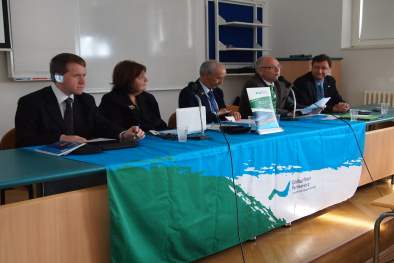It was a join initiative of Global Water Partnership Central and Eastern Europe (GWP CEE), GWP Technical Committee and World Meteorological Organization (WMO). The main objective of the workshop was to formulate and commit to the Integrated Drought Management Programme (IDMP) initiative.
The workshop brought together 58 key stakeholders from different sectors such as meteorology, water management and agriculture and international organizations - International Commission for the Protection of the Danube River, UN Economic Commission for Europe, United Nations Convention to Combat Desertification and Drought Management Centre for South Eastern Europe.
Unlike floods, drought is a natural phenomenon that takes some to build up and is difficult to predict. Several indicators used in climatology and agriculture have been established to assess to which extent drought occurred. Recently, GWP CEE has prepared a mapping study reviewing existing policies and strategies in Central and Eastern Europe.
In his opening speech, Dr. Mohammed Ait Kadi, GWP Technical Committee Chair said "A drought is a moment of strain. Approach to mobilize stakeholders need to change over the time as drought might change from seasonal episode to a long term famine. The most important is to create alliances for cooperation that will be able to react to changes".
Picture is different across the world. In South Asia, not only crops are in stake but also livestock management which is one of main pillars of the local economy. Insurance against drought will also not work out well in this part of the world. Dr. Pervaiz Amir from GWP South Asia proposed setting up endowment fund to address drought and strengthen institutional framework with Regional Drought Management Center, similar to Drought Management Center for South Eastern Europe.
Galina Stulina GWP Central Asia and Caucasus pointed out that Central Asian countries have to develop their own national policies to deal with climate change, where the development of alternative environmentally friendly energy sources and energy efficiency should become key priorities.
According to Milan Matuska, Regional Coordinator "Experts from different sectors proposed various measure to mitigate negative consequences of drought such as special tillage helping farmers keeping more water in soil than before".
Prof. Pavol Bielek from Slovak Agricultural University in Nitra mentioned in his presentation that around one third of precipitation in Slovakia is accumulated in soil which has an important role in storing water in landscape. However, soil water holding capacity is actually decreased by compacting upper layer by heavy farm machinery or sealing of surface due to construction of roads and buildings.
The workshop served as a peer review of the regional Drought Management Programme by key stakeholders. Involvement of more sectors such as tourism, navigations and insurance companies during implementation phase was echoed by the participants.
By end of the year, recommendations and suggestions will be incorporated in a detailed workplan and budget for 2013-2015 forming a basis for the new programme.
For more information contact GWP CEE Regional Secretariat at gwpcee[at]shmu.sk
